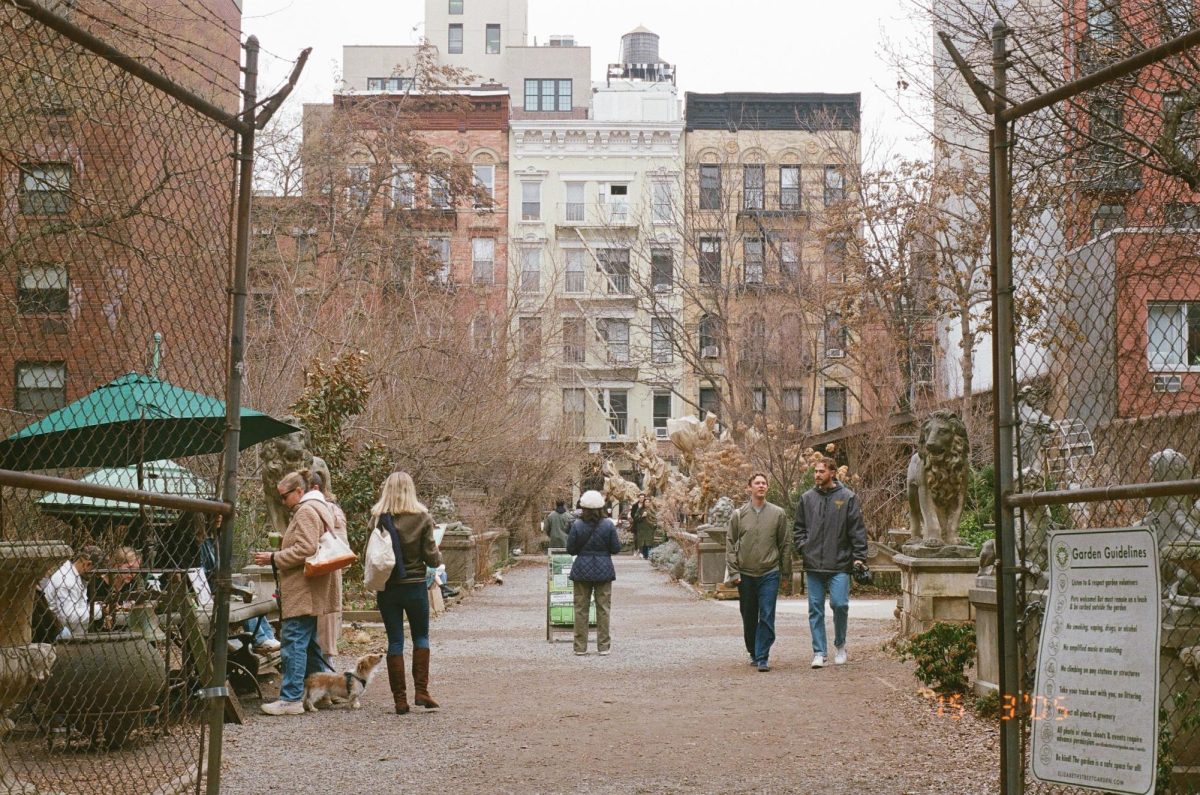On April 1, hundreds gathered at Elizabeth Street Garden in Little Italy for an evening of poetry readings, live music and protest. Those in attendance included councilmember Christopher Marte, singer and writer Patti Smith, actress Dianna Argon and members of the greater community, who were not only there to enjoy the garden together but to protest its imminent eviction for real estate development.
New York City has a history of threatening community green spaces for development, like with the beloved Lower East Side Garden — also known as El Jardín de la Esperanza — which was bulldozed in 2000, and the Pleasant Village Community Garden in East Harlem, which was also targeted for affordable housing development in 2018. The Elizabeth Street Garden is next in line.
Ultimately, urban green spaces foster a sense of belonging, providing a place to meet your neighbors, make connections and strengthen your community’s well-being. Elizabeth Street Garden hosts free weekly events — from yoga to tai chi classes to poetry readings — and has plans to fight food insecurity and increase the garden’s biodiversity by building a greenhouse and composting station as part of their Conservation Land Trust proposal. But because of the threatened eviction, the garden has had to halt developing more public programming and resources for the community and divert its resources to legal battles against the proposed Haven Green project.
The project promises to be a “123-unit deeply affordable, LGBTQ-friendly rental complex for seniors” and is scheduled for construction this summer. Its supporters frame the development as a moral decision — an answer to our city’s urgent housing crisis.
The idea that New Yorkers must sacrifice their beloved green space to receive affordable housing is a false binary. There is a surplus of vacant lots throughout the city waiting to be developed for affordable housing, so community-run gardens should not be targeted. New York City is in a desperate housing crisis, but if city officials and real estate developers seriously care about improving their citizens’ quality of life, why do they continue to attack our community spaces? When you treat community gardens as dispensable options, you make communities dispensable too.
On Elizabeth Street Garden’s website, they have even outlined three alternative site proposals after having proposed 388 Hudson in 2015, which the city took 6 years to recognize as a viable building site. The developers behind Haven Green claim that they will incorporate a green space that will “reflect the vision and identity of the community.” But how can a space be designed for a community that strongly opposes its construction, with over 130 local seniors, nearly 300 local organizations and businesses and local students from elementary school to college having written open letters to Mayor Eric Adams opposing the eviction? The community has spoken, and its heart is rooted in Elizabeth Street Garden.
Haven Green has already outlined amenities, which include “services specific to elderly LGBTQ residents and neighbors.” Previously unhoused LGBTQ+ residents are more than deserving of affordable housing, but Haven Green has not entailed what these services are and how they would directly benefit the tenants or larger community. If a preexisting community space serving hundreds is going to be replaced, developers must be direct and transparent about their mission, especially when it is meant to aid a marginalized group that has historically faced discrimination in housing. Vague promises of inclusion are not enough to cover the displacement of an existing community.
Community gardens are not luxuries — they are a vital part of our community’s well-being. They prioritize people over profit, are entirely volunteer-run and are devoted to regenerating previously mistreated land while cultivating a welcoming space for all. You cannot simply bulldoze a garden and expect to replicate its identity, for that would require replicating the love, hard work and resistance that has gone into a place like Elizabeth Street Garden.
To help save the Elizabeth Street Garden, you can join the public letter writing campaign here, and tell Gov. Kathy Hochul, Adams and the New York City Department of Housing Preservation and Development why the garden is worth saving. You can also donate to their legal fund or volunteer to show your support as well.
WSN’s Opinion section strives to publish ideas worth discussing. The views presented in the Opinion section are solely the views of the writer.
Contact Ariadna Ruiz at [email protected].























































































































































